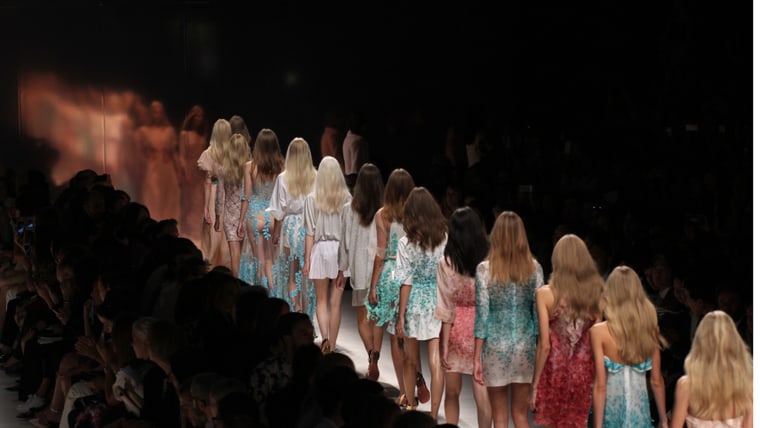Do fashion models need workplace protection as much as coal miners? Or is requiring a body-mass index check for young models "creepy" and ineffective?
An editorial published Monday in the American Journal of Public Health urges the United States to follow France's lead in banning exceedingly thin models from catwalks and magazines.

The U.S. needs to join in regulating the hiring of underweight models, Harvard public health experts argue, saying that together the U.S. and France can send a powerful message to the fashion world — and help prevent serious health problems among young women, including anorexia nervosa and death from starvation.
France just passed legislation requiring models to provide a doctor's certificate assuring they're healthy before they can work in the country.
Related: Amy Schumer gets emotional talking about her body image
The U.S. Occupational Safety and Health Administration (OSHA) should set regulations prohibiting the hiring of models below a body-mass index of 18, according to the editorial by S. Bryn Austin, director of the Harvard Chan School’s Strategic Training Initiative for the Prevention of Eating Disorders (STRIPED) and professor in the department of social and behavioral sciences, and Katherine Record, also with STRIPED and an instructor in health policy and management.
A BMI of 18 would mean a 5'10" model would have to weigh at least 125 pounds.
A benefit to all women?
The regulations, the editorial argues, would protect fashion models from "workplace hazards" in the same way workers in other industries with high levels of certain diseases and disorders — for example, coal miners who developed lung cancer at increased rates — have been protected in the past.
At the same time, banning images of dangerously thin models would benefit all women, the experts argue.
“There is a greater health goal of reducing incidences of anorexia and other eating disorders by changing the image of women that is perpetuated so widely by the fashion industry,” Record tells TODAY.
Approximately 10 percent of all American women struggle at some point with anorexia nervosa, Record says, with 70 percent of U.S. teenagers saying they identify a “perfect woman” by the images they see in print media.
She acknowledges BMI is an imperfect form of measurement, especially for people within a healthy range or slightly above what’s considered a healthy range.
"But, when you get as low as these models where the average BMI is 14, which is two points below the World Health Organization’s threshold for starvation, the arbitrary nature of the utility of that BMI goes out the window because you are truly starving to death.”
Related: We say yes! Mercy Watson stars in David's Bridal as a size-14 model
People in treatment for anorexia and other eating disorders have their BMIs monitored as an indicator of their progress, says Record.
The Harvard editorial references a harrowing real-life scene of a starving model too weak to work. The scene is excerpted from a controversial 2013 editorial, "The Truth About Size Zero", by former Vogue Australia editor-in-chief Kirstie Clements.
Celebrate all shapes and sizes
Yet Clements opposes BMI regulations because the bans are difficult to police.
“It commodifies women in a kind of revolting way," Clements tells TODAY. "This idea that you have to weigh women and check their bodies is creepy. It’s almost like getting a horse and checking its teeth.”
Clements believes more openness within the fashion industry would be more effective and that fashion editors should be "vigilant" about not putting waif-like models in their pages.
Related: Zendaya hopes to 'spark a change' as a champion of positive body image
“There needs to be more transparency and honesty when there are people around a girl who has an eating issue," she says. "Even when she's making money for them."
Young designers are already beginning to celebrate bodies of all shapes and sizes, she says, mentioning recent fashion shows whose real-life models were first found on Instagram.
"Probably what we should try to do is embrace everything instead of trying to regulate one look."